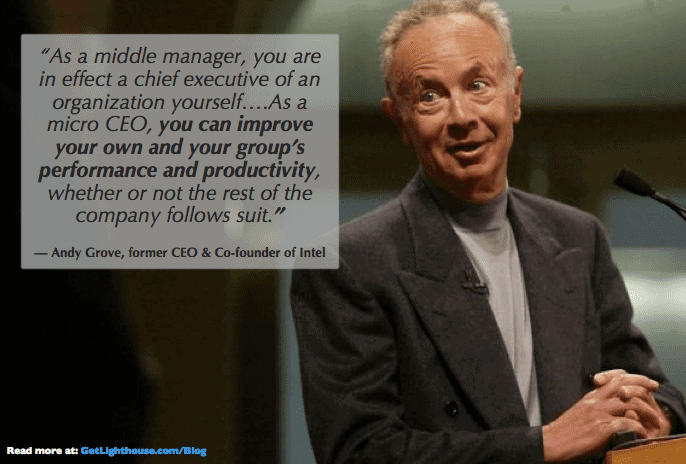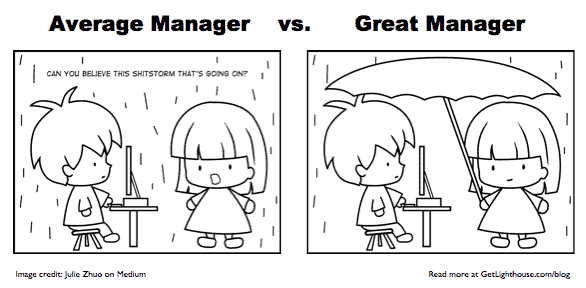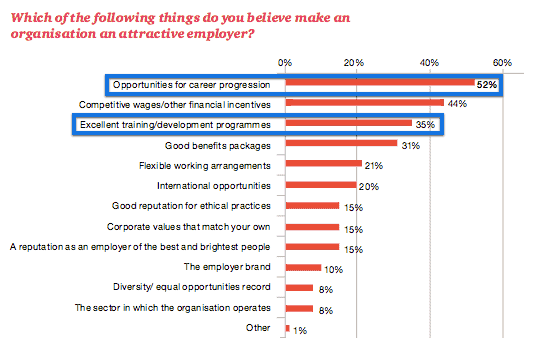Ah, the holidays are here and in full swing. Christmas and Hanukkah are here for many people (and a week or two away in the Orthodox Christian world), and New Years fast approaches as well.
If you're a good leader, now is a time to appreciate your team and give thanks for all that you've worked together to accomplish. You may even be thinking about all the awesome stuff you'll accomplish together in the new year.
However, for bad leaders, the feeling is quite the opposite. There is every reason to feel dread. To be worried, and scared.
If you're a bad leader, you're at some of your greatest risk of the most costly damage of all: team turnover. Here's why.
Why bad leaders should fear the holidays
Who doesn't love a break? Step away, recharge the batteries, and enjoy a slowdown in the rat race.
However, if you're a team member frustrated by working for a bad leader, a slow down is exactly what you need to get perspective. It gives you the chance to zoom out and see how unhappy you may be, and recognize that the root cause is one or more bad leaders making work miserable for you.
The holidays in particular create the perfect storm for this type of reflection, and a drive for making a change for a few reasons:
1) The ultimate fall back question for your relatives: "How's work?"
The holidays brings people together. Whether you spend it with friends or family, there's bound to be a lot of small talk and catching up. Given your employees spend more than 1/3rd of their life at work, there's a pretty good chance their job is going to come up in these conversations.
How many times does someone have to be asked, "how's work?” before they really think long and hard about it? Even if they force a smile, change the subject, or focus on the positives, the seed will be planted.
Once they start thinking about whether they're really happy at work, the wheels are in motion: if they're unhappy they'll start considering if it's time for a change. That's when they take the last bit of their holiday break to update their resume and take that friend or relative's offer to help connect them to a new opening.

2) The long look out the window
When you're busy running from project to project, it's easy to miss the forest for the trees. Yet, when you have a long flight or drive to go visit family, you suddenly have a lot of time to think and reflect.
When your people look back at the last year, which story will they replay in their minds:
- The golden year
"Everything is great. I got to work on exciting, challenging projects. When I had a problem, my manager and I worked through it. I enjoy my colleagues, and can't wait for the projects after the holidays." - The grinding year
"Work was really tough this year. I tried hard to make things work, but felt like I was ignored a lot. Some of my coworkers are great, but I can't stand <so and so>. Sometimes, I felt like I was living a Dilbert comic or a scene from Office Space. Is it worth putting up with for another year?"
Unfortunately, for bad leaders, the grinding year may be how they see their experience. There's only so much that a good paycheck, convenience, or promise of unrealized future gains (promotion, raise, bonus, or special project) can do to retain them.
With enough time to reflect, they'll add up all the detractors and recognize they outweigh the reasons to stay.

3) New Year's Resolutions: A time for change
For every resolution along the lines of, "I'm finally going to get in shape,” there's also a lot of thoughts about their next career move. If you're not growing your people, or if they're unhappy working with you, there's a good chance they will make a resolution to look for a new job.
Keep in mind as well, this is often a decision that involves others. If they have a family, their husband or wife may have tired of hearing the complaints about work, or a friend or roommate may make the same observation. As they discuss together resolutions and changes they want to make in the new year, if there's reason to change jobs, it's likely to come up.
---
The thing that makes these circumstances so hard for bad leaders is that it's during a time there's not much you can do.
If an employee has been unhappy throughout the year, then the damage is already done. The seeds for why they would want to make a change are already planted. The holidays is just a series of events that cause them to really reflect on what's happened.
But don't give up. All is not lost...yet.
As Jason Lemkin writes, "by the time they have an offer, it's too late.”
Fortunately, they can't go on an interview and get an offer over the holidays. However, they can start first thing in January. This means you have a very narrow window to not just save them, but make the fundamental changes necessary to improve the work environment, so they want to stay.
Culture change needed? No week like the 1st week of the year to Walk a New Talk.
— Tom Peters (@tom_peters) December 27, 2016
How to make your employees want to stay.
Like it or not, people leave managers, not companies. If your team is unhappy, it's on you to fix it.
The good news is, this also means you always had the power. No matter what's going on in the rest of the company, you can improve things for your team. Maybe you can't fix everything, but you can make some changes, and shield them from other things.
Here's the highest impact things you can do right off the back, to turn things around if you've been one of those "bad leaders" at times:
1) Start having 1 on 1s, or improve the ones you have.
Your 1 on 1s are a Swiss army knife for problems, challenges, coaching, feedback, and growth conversations. By setting aside just a little time (60 minutes every 1-2 weeks), you can turn things around.
Here's a few tips specific to your situation if you're worried someone is going to quit:
- Be humble
- If you think they may be unhappy they've probably been that way longer than you realize. Be open to their feedback and criticism and really listen to what they have to say. This post gives you a full process to follow. - Ask good questions
- If you usually talk about work and projects, you're wasting your one on ones. Status updates don't fit in 1 on 1s. Here's some questions to help you get started for ICs or for managers that report to you. - Follow up and keep your promises
- You only get one shot at this. If they do open up to you, you have to show things are going to change, so make the meetings actionable, and follow through on what you discuss. If you give them hope it's improving, they'll stay. If not, they're gone.
Your team members need hope things are going to get better. 1 on 1s provide an essential way to start making the progress and sustain it throughout the year. Use them to hold both of you accountable over time, and ensure these kinds of discussions keep happening consistently.
2) Dive in and make progress on their career.
Career growth is the #1 perk people want across a myriad of studies from Deloitte, Gallup, PwC, and others. They want it more than free lunches, healthcare, and flexible work schedules.
Think about that. The "perk” that costs you the least, and adds the most value directly back to your organization, is what people want most, and stunningly, they're not getting it.
If you want to prevent losing especially your best people, ask yourself:
- Are they growing?
- Are your people still challenged?
- When was the last time you talked about their career with them?
- What can you do to tap into their interests in future projects?
- Do your team members have the skills to cover for each other?
One of the most common reasons you can lose someone that otherwise seems happy is growth. They hear about an exciting new challenge, or a side project, or open source work draws them to a new opportunity. And next thing you know they're moving on to their next opportunity…outside your company.
Living in Silicon Valley, I hear this with stunning regularity from friends and acquaintances. They work at companies with infinite opportunity as they experience hyper growth, and they still leave. Why? Because there was never a conversation about their growth to recognize that they'd be interested in any of the openings at their current job.
Not sure how to have a career conversation? Here's the best places to start:
- 3 ways to start a career discussion
- What to do if someone isn't sure about their career goals
- How to grow your people, even when you can't promote them. (or they don't want to be)
3) Get a system to be consistent
One of the cardinal sins of bad leaders is inconsistency. If your team doesn't trust you, there's no chance they'll come to you with problems or feedback. They also won't tell you they're thinking about leaving until they have the next offer in hand…and then it's too late.
The best way to ensure you're consistent is to get yourself a system to help. Don't assume you'll remember, or that they'll be okay if you forget half the time. They won't be.
Instead, think about how you can be a great manager that keeps their promises for everyone on their team. That's prepared for their 1 on 1s. That remembers what's important to them.
But who can remember all that?
Don't pressure yourself to keep it all top of mind. No one can juggle all of that, especially when you're slammed, and you and the team are stressed. Yet, that's when you need to be at your best with them. Unfortunately, that's when bad leaders are usually at their worst.
Anyone can be a good enough boss when things are great. You have time to think about your actions, and can take it easy on your team. However, when the chips are down, and there's a tough deadline, that's when the real skills of a leader come through. How do you perform at those times?
Instead of regretting another tough cycle of balls dropped and discouraging your team, get organized and trust a system to help you. Be the leader they always wanted you to be, by getting the help you need.
Get the help you deserve.
Great managers know they're always on stage. Their team is always watching the example they set. If you want to be a great manager, too, and retain your team members for the long haul, you need to do the things that make all the difference.
Are you growing as a leader? Are you building the skills you need?
Get better as a leader every day with our bite-size leadership training programs, Lighthouse Lessons. Purpose built for busy managers like you, they help you become a better leader by mastering the skills that bring out the best in your team. You can learn more and sign up here.











